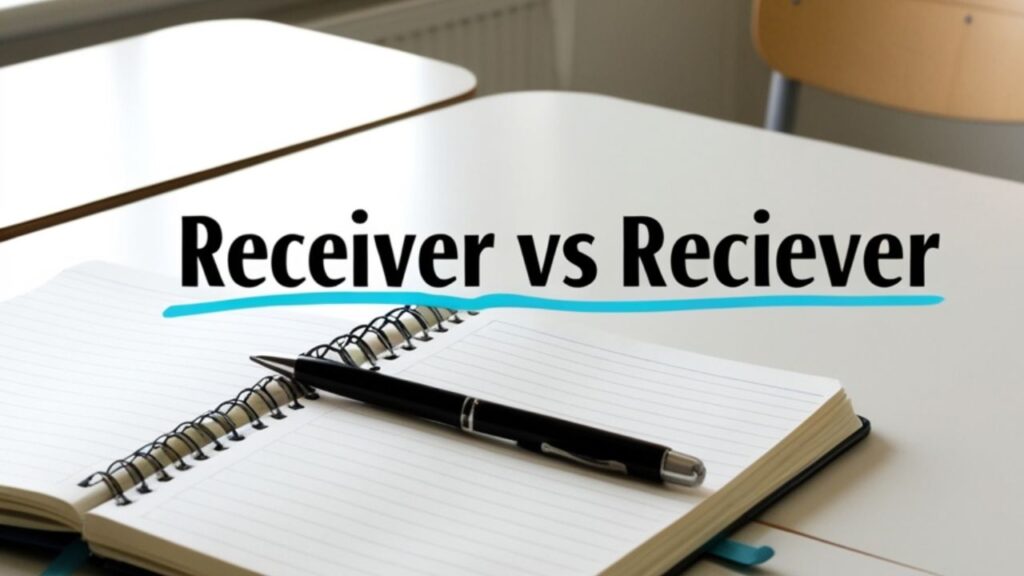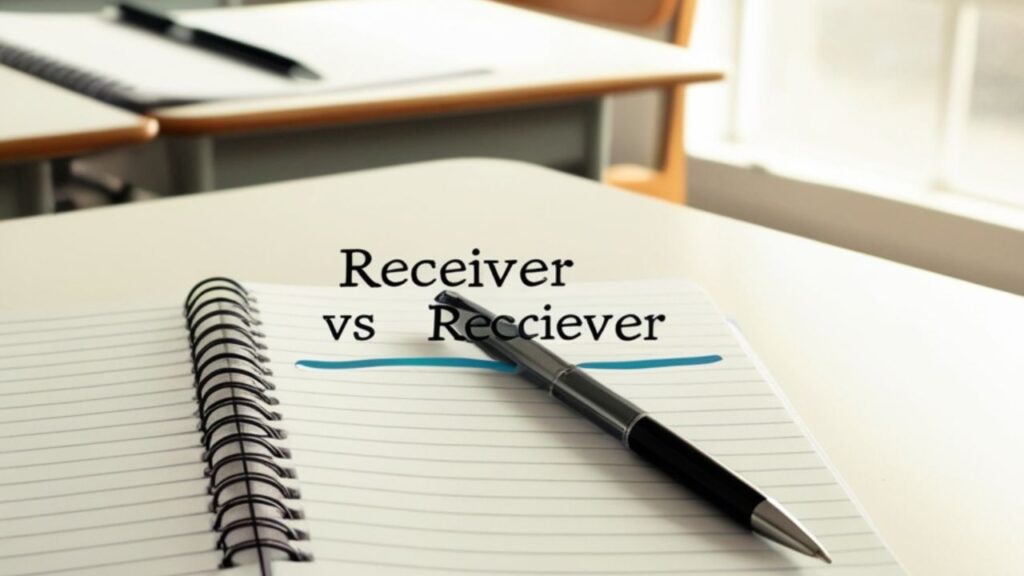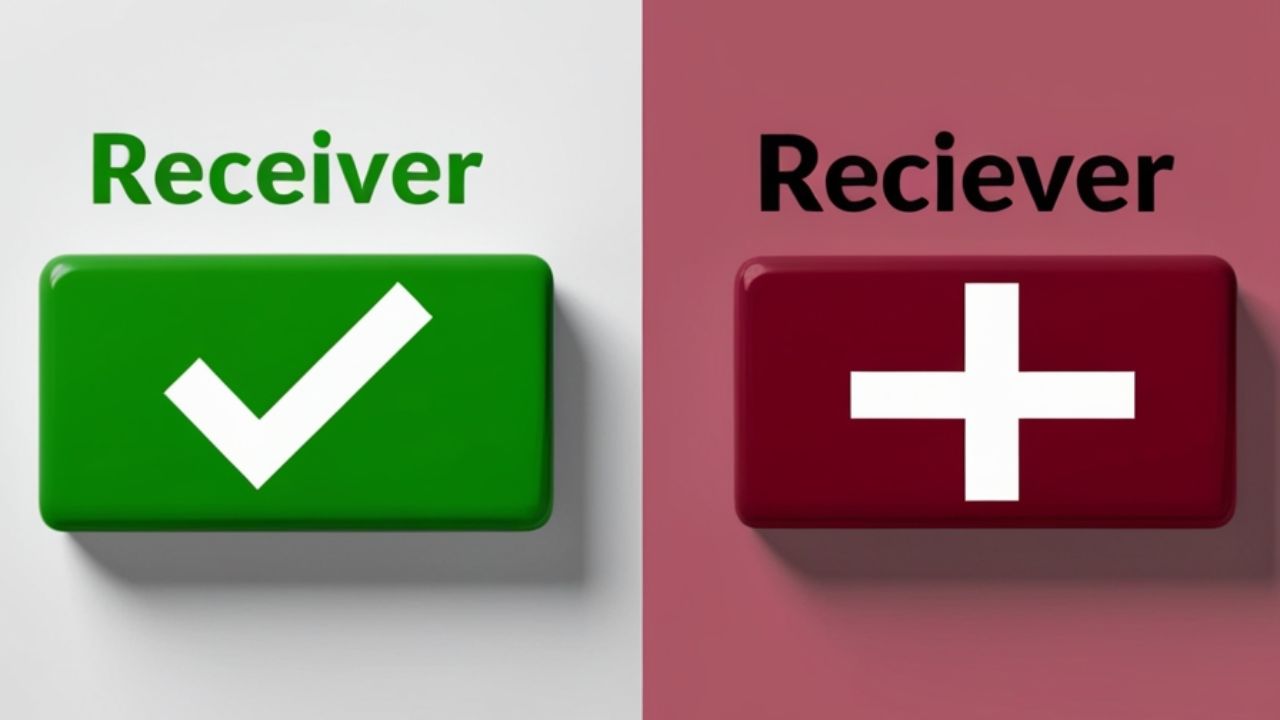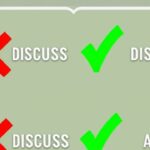Receiver is the right way to spell the word. It comes from the old word receive. People often make mistakes by writing reciever, but that is not correct. Using the proper form shows care and good writing habits.
In technology, a receiver collects signals from devices like TVs or radios. In sports, it is the player who catches the ball. In law, it manages property or money. Learning these examples helps remember the correct spelling and use in daily life.
Spelling errors happen when typing quickly or guessing. Breaking the word into parts, like re + ceive + r, makes it easier to write correctly. Practice reading and writing it in sentences. Using tools like dictionaries can also help prevent mistakes.
Receiver vs Reciever – A Spelling Breakdown
Receiver has a clear correct spelling. People often write reciever by mistake, but this is wrong. The word comes from receive, and using it properly shows attention to detail. Knowing the correct form helps in writing clearly and professionally.
This word appears in many areas. In technology, it picks up signals. In sports, it catches the ball. In law, it handles money or property. Learning these examples makes it easier to remember the correct spelling and use it in daily life.
| Correct | Incorrect |
| Receiver | Reciever |
Understanding the Word “Receiver”
The term “receiver” isn’t just a spelling challenge – it’s a word with multiple meanings depending on the context. Understanding these will help you see how widely it’s used.
Root and Origin
- Receiver comes from Middle English receyvere, which meant someone who receives.
- It traces back to Anglo-French receivre, meaning “to take” or “to accept.”
- The Latin word recipere is the oldest root, meaning “to take back” or “to receive.”
Definitions of “Receiver”
| Context | Definition |
| Technology | A device that receives signals (e.g., in a radio, TV, or smartphone). |
| Law | A person appointed to manage assets in bankruptcy or legal disputes. |
| Sports | A player who catches the ball (e.g., wide receiver in American football). |
| Communication | The person who receives a message in any communication model. |
Why “Reciever” Is Always Incorrect
You won’t find “reciever” in any credible dictionary. It’s a simple spelling error, often resulting from misapplying spelling rules or typing quickly.
See also : Copywritten vs. Copyrighted: Key Differences Explained
Common Causes
- People type too fast and make mistakes like reciever.
- Misunderstanding spelling rules, especially “I before E except after C.”
- Relying on memory or guessing instead of checking dictionaries or tools.
Does “I Before E Except After C” Apply Here?

The rule “I before E except after C” helps with spelling words like receiver. Since the word has a “C” before the ei, it follows the rule. Remembering this rule makes it easier to write words correctly and avoid common mistakes.
Many words break the rule, but in this case, it works. Using the rule with receive and its forms guides proper spelling. Practicing reading and writing helps lock in the correct letters and builds confidence for writing clearly in all situations.
- The rule “I before E except after C” works for receiver because it has a C before the ei.
- Following the rule helps avoid mistakes like reciever.
- Checking the root word receive ensures the correct spelling every time.
Examples of “Receiver” in Real Sentences
Let’s see how “receiver” is used in different contexts.
Technology:
The Bluetooth receiver stopped working after the latest update.
Law:
The court appointed a receiver to manage the company’s assets during the trial.
Sports:
He played as a wide receiver for the college football team.
Communication:
| Domain | Sentence |
| Technology | The receiver connects wirelessly to the main audio system. |
| Sports | That wide receiver made a game-winning catch. |
| Legal | The receiver has legal authority over the business’s operations. |
| Everyday Use | She picked up the receiver and made a call. |
Common Spelling Errors Like “Reciever”
| Incorrect | Correct | Reason |
| Reciever | Receiver | Wrong placement of “i” and “e” |
| Acheive | Achieve | “i before e” misused |
| Percieve | Perceive | Similar confusion after “c” |
| Deceitfull | Deceitful | Extra “l” added |
| Beleive | Believe | “i before e” rule not applied |
What Causes These Mistakes?
- Writing too quickly can make people type reciever by accident.
- Looking at how a word sounds can trick the brain into wrong spelling.
- Not seeing or reading the correct word enough makes mistakes more likely.
Why Do People Mix Them Up?
People often rely on what “feels right” when writing, especially with commonly used words. “Reciever” seems to make phonetic sense, which is why it’s a frequent typo.
Cognitive Reasons Behind the Error
- The word sounds like it could be spelled reciever, which confuses the brain.
- Typing habits make people repeat the wrong spelling from memory.
- Misunderstanding rules like “I before E except after C” causes errors.
Memory Tricks to Remember the Correct Spelling
Don’t let this small error trip you up. Try these tricks:
Visual Mnemonics
- Remember ReCEIVE first, then add r to make receiver.
- Picture someone receiving a letter or package to link meaning and spelling.
- Break the word into parts: re + ceive + r to see it clearly.
See also : Its Self or Itself? Simple Grammar Guide Explained
Break It Down
- Split the word into parts: re + ceive + r.
- Focus on the middle ceive part to remember the correct letters.
- Putting the parts together helps spell receiver correctly every time.
Rhyme & Repeat
- Say aloud: “I before E after C” to remember the rule.
- Repeat the word receiver several times while spelling it slowly.
- Make a short rhyme or chant to lock the letters in memory.
Flashcards and Spaced Repetition
Tools like Anki or Quizlet can help build spelling accuracy over time.
Check Yourself Before You Send It
Before submitting an important document or email:
Proofreading Checklist
- Read your writing slowly to spot mistakes like reciever.
- Use a dictionary or spelling tool to check words.
- Double-check important words and sentences before sending or publishing.
Recommended Tools
| Tool | Features |
| Grammarly | Real-time grammar and spelling checker |
| Hemingway Editor | Improves clarity and highlights errors |
| Google Docs | Built-in spellcheck + grammar corrections |
| Microsoft Editor | Advanced spelling/grammar features |
Practice: Use “Receiver” in the Right Context

- The wide receiver caught the ball during the game.
- Please hand me the phone receiver to make a call.
- The email receiver replied quickly to the message.
Pro Tip:
Create your own sentences to practice. Repetition helps engrain the correct form in your memory.
Are There Any Exceptions?
- The spelling receiver has no alternate forms.
- Reciever is always incorrect, even in casual writing.
- This rule is the same in all English regions and contexts.
Final Tips to Remember and Retain
Want to make sure you never misspell “receiver” again?
Here’s what works:
- Read books and articles to see receiver used correctly.
- Practice writing the word in sentences to remember the spelling.
- Use tools like dictionaries or flashcards to check and reinforce learning.
Practice: Use “Receiver” in the Right Context
Practicing with the correct spelling helps a lot. In sports, the wide receiver catches the ball to score points. Writing it in simple sentences every day strengthens memory and makes it easier to spell the word correctly in all situations.
In communication, the receiver picks up messages clearly. Using the word in school work or emails improves writing skills. Repeating it in small exercises, reading examples, and writing your own sentences helps lock the correct letters in your mind for long-term learning.
Pro Tip:
Create your own sentences to practice. Repetition helps engrain the correct form in your memory.
Are There Any Exceptions?
- The word receiver has only one correct spelling.
- Reciever is never correct in writing.
- No regional or informal versions change this rule.
Final Tips to Remember and Retain
Want to make sure you never misspell “receiver” again?
Here’s what works:
- Read books or articles to see receiver spelled correctly.
- Write the word in sentences often to remember it.
- Use dictionaries, flashcards, or spelling tools to practice and check.
Summary: Receiver vs Reciever
| Aspect | Correct Usage | Incorrect Usage |
| Spelling | Receiver | Reciever |
| Dictionary Validity | Yes | No |
| Root Word | Receive | None |
| Pronunciation | /rɪˈsiːvər/ | Same, but misleading spelling |
Key Takeaways
- Only receiver is the correct spelling; reciever is wrong.
- Following rules like “I before E except after C” helps avoid mistakes.
- Practicing reading, writing, and using the word in context builds strong spelling skills.
Final Thoughts
Using the correct spelling of receiver is important in writing. Mistakes like reciever can make text look careless. Paying attention to details and practicing proper forms helps improve reading, writing, and understanding in school, work, or everyday communication.
Remembering rules and breaking words into parts makes spelling easier. Tools like dictionaries, flashcards, and reading examples strengthen memory. Practicing regularly with receiver in sentences helps it stick. This builds confidence and ensures writing looks polished, professional, and easy for everyone to read.
FAQs
How Do You Spell Reciever or Receiver?
The correct spelling is receiver. Reciever is a common mistake. Always use receiver in writing to stay accurate and professional.
What Does “Receiver” Mean?
A receiver is someone or something that receives messages, signals, items, or responsibilities. The meaning changes based on context like technology, law, sports, or communication.
How Do You Spell Receiver in Football?
In football, the player who catches the ball is called a receiver. Always spell it receiver, not reciever, in sports writing.
Who Is Called a Receiver?
A receiver is a person who gets something, such as a message, package, or football. The term applies in sports, law, communication, and technology.

Join Bibcia on a journey to master English grammar. Discover easy lessons, writing tips, and practical examples designed to make learning grammar simple and effective.










